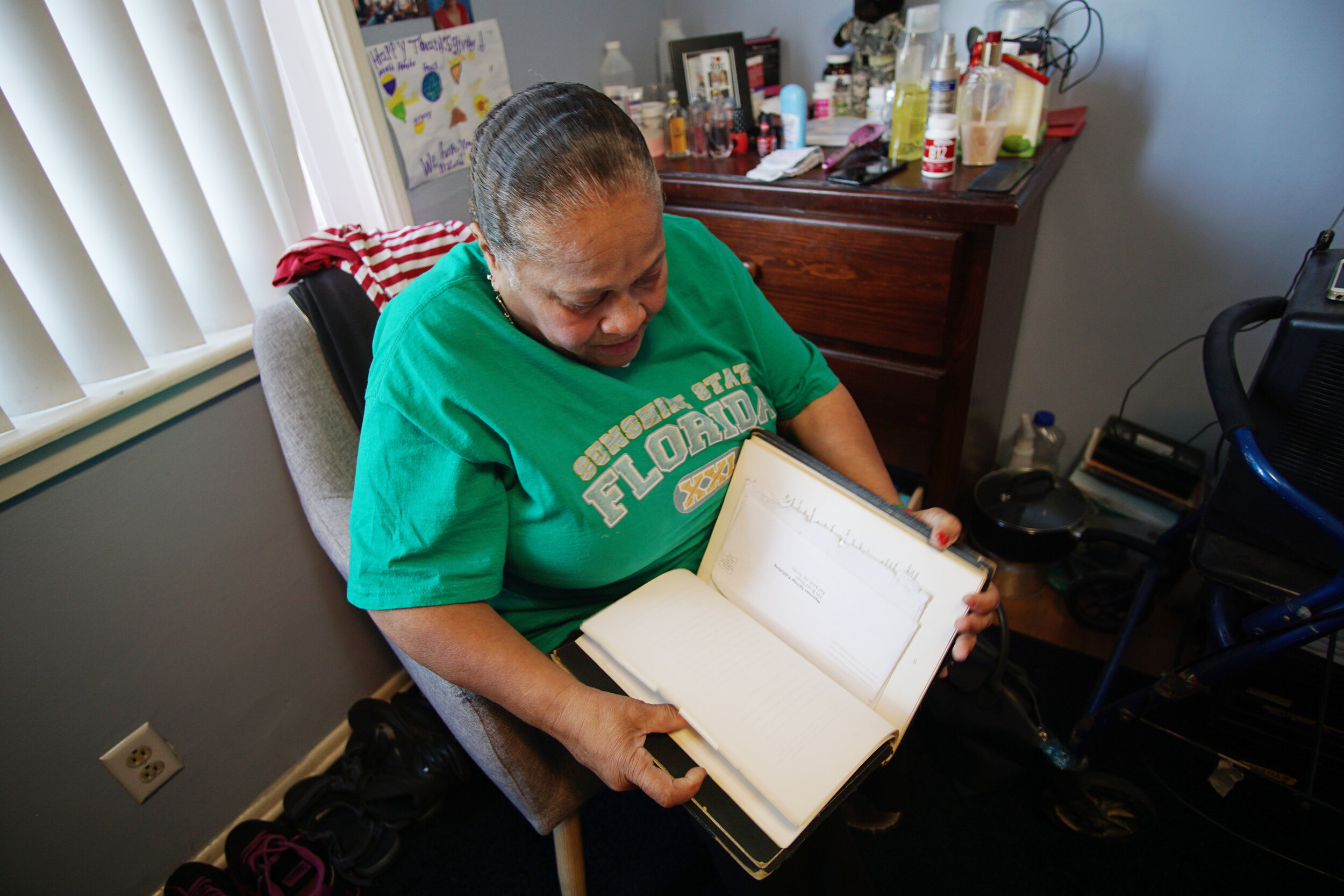Jessie's story
Jessie looked up at the sky through the tattered roof of an abandoned shed. As the rain poured down, wetting her face, she thought, “I’m in a nightmare. This is not my life.”
“I’m in a nightmare. This is not my life.”
All her life, Jessie had a dream: to meet a decent man, get married, and start a family. For a while, it seemed like her dream might come true. She met a mathematician and fell in love. They got married and had a son. She and her husband were together for 19 happy years. She adored him. They lived in a comfortable house in Palmdale, but her husband developed cancer, and in 2012, he passed away. “He was a great man, he lived for the community, and I miss him,” she says as she chokes up and fights back tears. “I wish he was here.” He left her a book, his PhD thesis, that she hopes to publish one day.
Jessie looks through her late husband’s PhD thesis.
Jessie’s name wasn’t on the mortgage of the house, so after her husband passed, she did not have enough money to pay off the rest of the loan and they had to move out. A neighbor took in her son, but Jessie was left to fend for herself.
At first, she was able to house-sit a home that was on the market. She lived there for nearly a year and a half, before it sold to someone else. Soon after, she was back on the streets.
Jessie did whatever she could to survive. At times she would squat in empty houses, going to Panda Express to wash up in the bathroom. When she had money from pan-handling, she would pay for a hotel room for $312/week.
The stress started to weigh on her, and she began experiencing anxiety and panic attacks.
Then she met Alycia Monroe, co-founder of Sisters on the Streets, a nonprofit that serves women experiencing homelessness. Alycia brought her to a Homeless Connect Day, where she connected with LA Family Housing.
Jessie entered LA Family Housing’s rapid rehousing program. They helped her move into shared housing. LAFH started by paying first month’s rent plus security deposit.
Jessie shows off her security badge.
Jessie had a little money saved up so she used it to get her security guard license, and she got hired as a security guard at Platinum Security. First she was stationed in security for the Department of Water and Power, working 5-6 days a week. Now she is working security at the 99 cent store.
With a steady income, month by month, Jessie began to cover more of the rent, while LAFH covered less. Now Jessie pays the full $950 rent on her own. “I feel really good. I’m doing this on my own. It’s a lot of money, but I have to do it.”
Jessie’s phone rings. It’s her friend, Mary, a homeless woman she befriended while working at the 99 Cent Store. Jessie brings her food, clothes, and bought her boots. “I help her just like Alycia helped me. I think Mary came into my life for a reason. I got her a phone so she can keep in touch with me so I know she’s ok.” Spurred by her own experience, Jessie is trying to get her connected to services.
““Some people are homeless because of circumstances. Things that happen to you that you can’t control. At the time I had no resources, I didn’t know where to go. It’s not a good thing to be homeless, it’s horrible. I don’t wish it on anyone. No one wants that.””
Images of Jessie’s family are posted on the wall of her room.
“Some people are homeless because of circumstances. Things that happen to you that you can’t control. At the time I had no resources, I didn’t know where to go. It’s not a good thing to be homeless, it’s horrible. I don’t wish it on anyone. No one wants that.”
Jessie reflects on what it took to get to where she is today. “I can’t believe it, I came this far. From being on the streets.”
Jessie has a new dream for the future. To publish her husband’s book and to find a place of her own to live, surrounded by community and loved ones.



